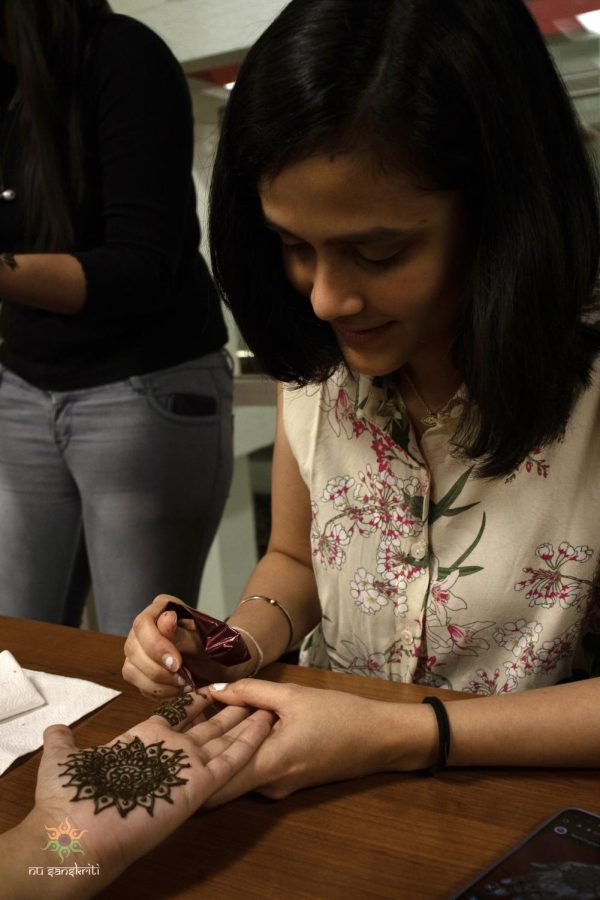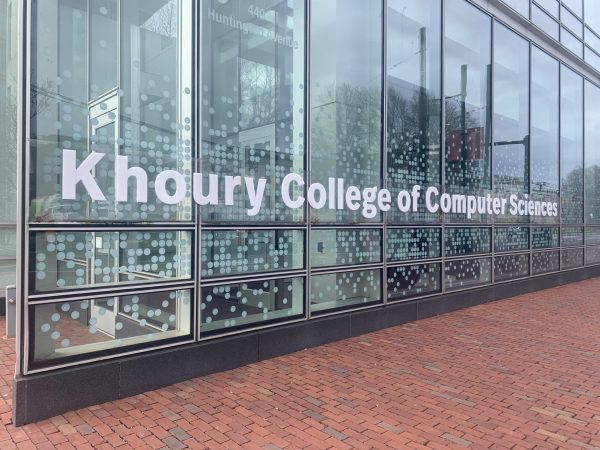NU Sanskriti plans Northeastern’s first-ever Indian Heritage Month
A member of NU Sanskriti paints Mehndi, or henna, on another member’s hand during an event held as part of the club’s Indian History Month celebration. While planning the month-long celebration, club leaders aimed to provide a platform for students to express their identity. Photo courtesy of NU Sanskriti.
March 9, 2023
For NU Sanskriti, Indian Heritage Month is a time for celebration, creativity and community.
With almost 8,000 Indian undergraduate and graduate students at the university, NU Sanskriti is one of the biggest groups on campus and in the United States. The organization was founded over 20 years ago, and it serves as Northeastern’s Indian Students’ Association. This month, NU Sanskriti is organizing Northeastern’s first Indian Heritage Month, looking to provide a safe haven for Indian students in unique and artistic ways.
NU Sanskriti is composed of students from across India, many of whom speak different languages, follow different faiths and have a diverse set of traditions. With a variety of groups, or “portfolios,” students can join, the club hopes to provide a platform for students to express themselves.
“We celebrate different festivals, we have different cultures and along with that, we have different events where people can showcase their talents,” said NU Sanskiriti President Sakshi Chougle, a graduate student studying project management.
For the first time ever, the group is hosting 14 events, along with daily guided meditation and yoga sessions, as a part of Indian Heritage month. These events are intended to share Indian culture with the larger Northeastern community. The group felt inspired to take on this effort after feeling underrepresented in campus celebrations.
“We found that Indians are one-third of the university and we aren’t getting that particular representation [on campus], so we decided to go ahead with [these events] just so people can feel at home and so others know what’s going on and what Indian culture is about,” said Vatsal Kapadia, a graduate student studying information systems. “It’s not just about namaste and yoga, it’s much more than that.”
Kapadia, who serves as the club’s head of finance and sponsorship, explained the purpose of these events is to make sure everyone, no matter how far they are from their home country, feels some sense of belonging.
“We thought this was much needed,” he said. “Everyone needs particular representation. Not a single guy or girl should feel like ‘Hey I’m not feeling represented here’ or ‘I’m just feeling left out.’ … We are trying to provide international students a secure space to showcase their individuality and help them smoothly adapt to different cultures.”
Two of the major celebrations the club is hosting this month are Holi and Tarang. These will take place March 12 and March 24 respectively.
“In March we always try to celebrate two of our major festivals. Holi [is] the festival of colors and Tarang is a cultural festival we organize every year that has dance, music and fashion,” Kapadia said. “It’s not just related to India, but it also represents very different aspects of India.”
In addition to the festival events, the club is putting on several movie nights, sports days, art sessions and educational talks. Most notably, by working with the Center for Emerging Markets, the club is hosting a talk with the President and COO of Honeywell, Vimal Kumar.
While the club is grateful for these collaborations, the group’s leaders expressed frustration with what they felt was the university’s lack of adequate funding and support for these events, despite catering to a large part of the student population. According to Debpriya Das, vice president of financial affairs for Northeastern’s graduate student government, graduate student clubs can get a maximum of $5,000 per academic year from the university. As of now, NU Sanskriti hasn’t received any money from the graduate student government this academic year, as they just applied. Das said the club will likely receive this funding soon.
However, Devansh Mehta, a creative writer on the club’s executive board, said the $5,000 is not enough.
“It’s really difficult to secure funding,” Mehta, a first-year graduate student studying advanced and intelligent manufacturing said. “We don’t get a dollar for every student we represent on campus, so we’ve had to diversify our resources and look to external sources. We have a couple of sponsors now, but even then it’s really difficult now because of the university’s policies. It’s difficult to jump through all the hoops and get through all the red tape and finally make something happen.”
The club chooses sponsors based on what would be most beneficial for the student body along with the greater Boston Indian community. This includes partnerships with Weee!, an Asian grocery store.
“The main criteria we look at when selecting potential sponsors is how it can help Indian students on campus,” Mehta said. “Every sponsor has some sort of Indian touch or grassroots to them.”
While some campus organizations have been supportive of the groups’ work, such as the Office of Global Services, Northeastern Alumni Relations and the College of Engineering, other university departments have not been as responsive to the club’s outreach efforts, causing NU Sanskriti to severely downsize their events.
“We want students to realize that managing 8,000 people is difficult financially, especially when you’re on such a tight budget. Because of a lack of responses [from the university] and lack of sponsors, we’ve had to scale down a lot of the events or had to cancel things,” Kapadia said. “We want students to know that we are doing everything we can to make them feel at home.”
Kapadia has found a home at NU Sanskriti, and he wants others at the university to have the same experience.
“Coming [from] 3,000 miles away and not knowing anyone is one of the worst things you can experience,” he said. “All of us are like a family. I can share anything with them and it’s always a great environment.”
Mehta agreed, saying the club has allowed him to foster unique and unbreakable connections.
“I’ve met people through Sanskriti who lived a few blocks away from me in India and I didn’t know them before coming here,” Mehta said.
Kapadia stressed that anyone, regardless of their background, is welcome at these events.
“This club is not just for Indians. It is for anyone who would like to participate,” he said. “Everyone is always welcome.”
Check out the calendar of events for Indian Heritage Month here.


















